Check out our Top Rewards Cards to boost your points earning and travel more!
Part 2 of my May 2010 North Korea trip (see part 1, and the following parts 3 and 4).
Miss Kim now more relaxed in a peach suit, Mr. Kim also loosening up somewhat, as we left Pyongyang behind. Kaesong is a traditionally prosperous city and its proximity to the DMZ marked it for development of a South Korea-invested economic zone. Glimpses of rural life along the way were grim but no more or less than in many other countries. Bypassing the city we entered the tranquil farmland of the DMZ passing the “Seoul 70 km” sign, and stopping at the guard house. In contrast to the South Korean side there is very little visible military build-up on the road to the DMZ. Within the DMZ itself, soldiers of both sides are limited to small pistols and Mr. Kim said they usually do not even wear helmets, but had them on due to the recent heightened tensions (the March 2010 sinking of the South Korean ship Cheonan).
Ahead was the narrow DMZ road to Panmunjom, with its tank-stopping concrete slabs overhead, supporting wires ready to be cut in case of invasion. The assembled tour groups drove single file, disappointingly not able to visit the Potemkin village with its gigantic North Korean flag. First stop was the Armistice Talks Hall, the original furniture still in place and Chinese tourists gleefully listening to the praise heaped on the sacrifices of Chinese soldiers and playfully asking the Westerner (me) to sit at the UN forces table and pose for mock signing and handshake pictures.
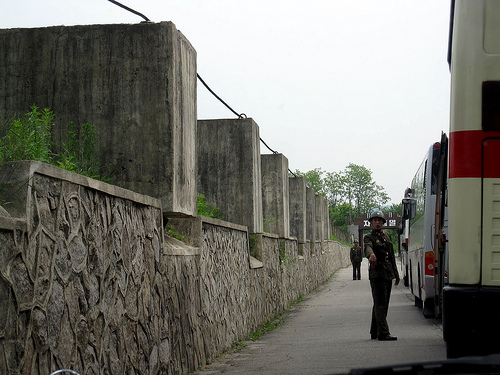
Entering the DMZ, concrete blocks ready to be dropped in case of invasion, though the busloads of Chinese tourists are allowed to pass
I had been prepared to avoid political topics, but the head guard, through Miss Kim interpreting, singled me out as the lone American and asked me many questions about the Cheonam torpedo incident, particularly what the outside media was reporting and the results of the recent meetings in Beijing. When pressed if I thought North Korea fired the torpedo, the best I could think of was to say, “I think that the North Korean navy is very skilled, so if they want to hit something, they will hit it,” and squeezed his firm bicep. Bemused, open-minded and well-informed, he turned to topics such as questions about Obama’s domestic popularity levels and the gulf oil spill. I said that it is very difficult for any US president, that the president is blamed for any issues that go wrong, “Like in your job, if any tourist tries to cross the border maybe you will be blamed,” I added. He playfully retorted, “No, they will be shot. I will not be blamed.”
He brought up themes I heard throughout my trip, that North Koreans feel trapped with everyone out to get them, that they want to be independent and, as he said “We want to be prosperous and develop, too.” No one would touch the subject of their own political situation and I tactfully refrained from futile prodding. But, the small number of people I conversed with in my trip consistently expressed a desire to be first of all, independent, and second, to lead happy lives. It is a constant tragedy of history that governments cannot find the common ground and reasonableness that comes so naturally to average people.
By this time we were at the demarcation line itself, blue huts straddling the concrete-marked border. With the South Korean door closed and two guards blocking the way (the opposing sides, peacefully, trade off use of the huts, with only one side in at a time), we could move around in the hut, crossing from one country to another, with the hulking army posts looming overhead on both sides.
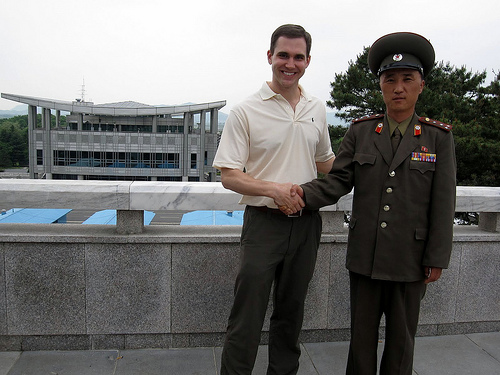
Head guard and a charming gentleman who asked me about subjects ranging from the Cheonan sinking to the BP oil spill and Obama's popularity ratings
Reluctantly leaving the DMZ behind, now knowing what it is like to face the US Army from the other side, Kaesong city proper was pretty and had some traditional architecture, especially one cluster of old buildings that survived the bombardment during the war and in which the Folk Hotel is located. The story goes that then South Korean President Syngman Rhee had some personal connection to the area so ordered it spared. The ‘royal lunch’ captured the loneliness of power, if not the delicacies of food that normally accompany it, as I was placed in a room alone, my guides taking their meal and break elsewhere, my every moved watched over by a waitress assigned to the room. The unrestored village behind the Folk Hotel was temping, but was strictly forbidden, and in the end I took a compromise walk with Mr. Kim to the central square with its ancient fortress gate and modern Kim Il Sung statue on the hilltop, only managing hurried glimpses down the narrow residential lanes.
Back in the car, we zipped to the Koryo Museum on the site of the millennium-old Songyungwan Neo-Confucian College with pleasant grounds, a few people playing volleyball and a newlywed couple out taking pictures. We wrapped up with a visit to the hillside fourteenth-century Tomb of King Kongmin and were soon back on the Reunification Highway bound for Pyongyang.
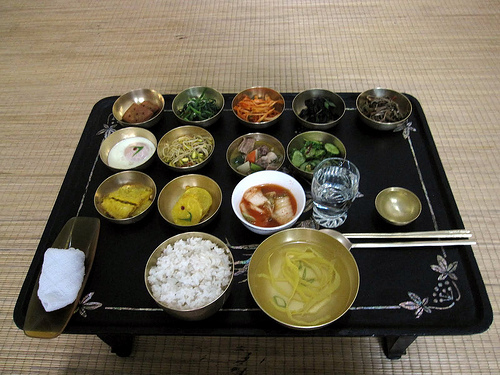
The sightseeing day wrapped up with a mildly interesting visit to the Mangyongdae Native House, where Kim Il Sung may or may not have been born, a major shrine for North Koreans, not unlike visiting Mao Zedong’s birth home in Hunan. The ‘local guide’ at the house gave the hard propaganda sell, which my regular guides thankfully spared me of most of the trip.
Before dinner we stopped at one of the few approved entertainment venues, the Pyongyang Gold Lane bowling alley, which surprisingly was packed with locals, paying the same price of 2 Euros/game that I had to pay, I was told. At that price they must have all been of the elite. At six o’clock sharp the place cleared out for people to go to dinner and only a few locals were left, while Mr. Kim and I battled for supremacy in our lane. He had a shaky start but I went to get a beer for him, and juice for Miss Kim, and by the time I returned, he had notched two consecutive strikes. I insisted that Miss Kim, who was sitting at the controls, show me the ‘anti-capitalist’ button she pressed to make the pins fall down but she would not give in. Later, though, fortune turned as I felled nine pins but was credited for a strike, breaking Mr. Kim’s resolve, he said later, and I just barely beat him. Great fun, especially the hot pink bowling shoes.
The long day and drive, and my good behavior, steadily won over my guides and by dinner we had jovial, wide-ranging conversation, aided with hearty toasts of soju. My life in China, with some similarities to North Korean life, provided a safe middle-ground to discuss many issues. Mr. Kim, I learned, is quite senior in KITC, has been overseas many times. Secure in his position, he felt more comfortable speaking, while Miss Kim steadily gained steam. They were particularly interested in my tours in South Korea, not so much the modern aspect of life, but the shared cultural heritage that they hope to see someday. Though state ideology has demanded dismissal of aspects of traditional culture like religion, people do not change so easily, and North Koreans see themselves, not the corrupt south, as true keepers of Korean culture. This was illustrated to me when Mr. Kim talked about the polite way to inquire when someone will marry, “When will I eat your noodles?” because long, cold noodles are served at every wedding. He asked me when I would next visit North Korea and I said of course to eat Miss Kim’s noodles! I clumsily teased if they would be ‘juche’ noodles, “dry with no seasoning but very strong,” juche being the official state ideology, meaning independence, self-reliance, etc, and used in propaganda to justify the daily sacrifice of life there. Even the seemingly blunt ideology is nuanced, as Miss Kim laughed and said I did not understand, that juche meant most of all to be independent and “do whatever you want,” so the noodles would be tasty as she likes them.
A quiet evening prompted musings on the uncertain future. Whatever political change comes, reunification will be a disaster if everyday North Koreans do not feel their dignity and feeling of self-independence are respected. And they are so isolated and unprepared to enter the modern global system, several generations raised in a bubble, that it is hard to imagine how reunification can be anything but extremely painful, however necessary long-term. It is easy to see how South Korea, Japan, China, the US and Russia, all find it more convenient for their self-interests to tolerate the status quo, though the challenges only grow with time. East Germany had an elder generation that had been connected to the whole of Europe, for North Korea, those people are mostly gone, leaving several generations with no experience of the outside world.
Tomorrow, plainclothes security, a film shoot, and a US spy ship.
Check Out Our: Top Rewards Cards ¦ Newsletter ¦ Twitter ¦ Facebook ¦ Instagram
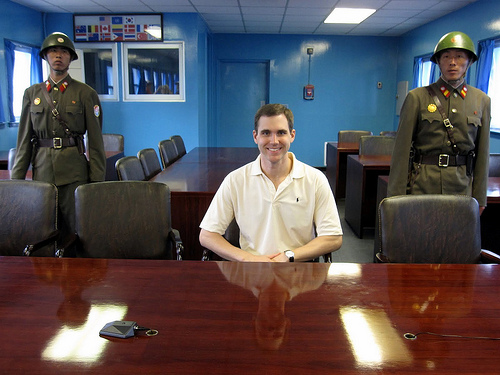
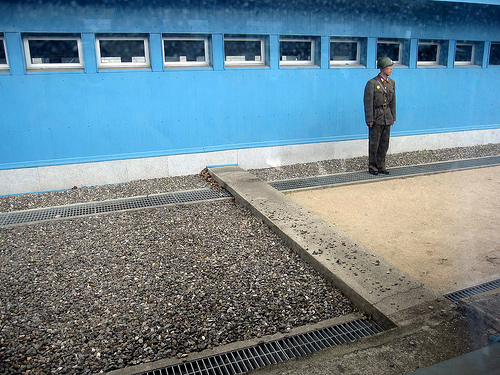
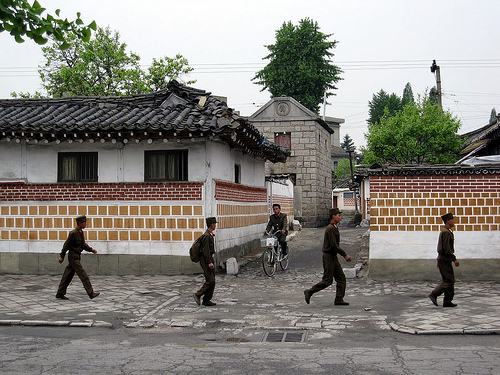
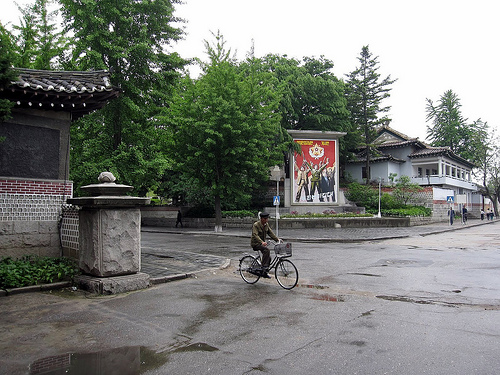
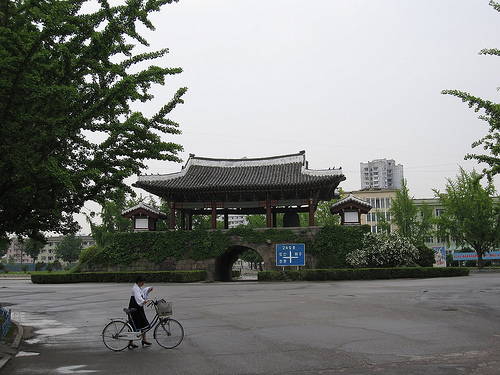
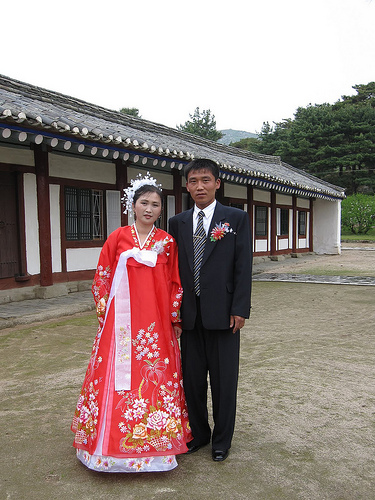
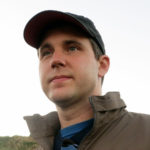
[…] those interested in my personal reflections from May 2010, please see parts 1, 2, 3, and 4 of my travelogue and the photo […]
No comment!
I got to say, you’re one brave soul for going into the DPRK. Have you thought about going toe Cuba?
It was worth the waith for Part II, thank you very much for giving such detailed account of your trip, I looking forward to the next section. Reminds me a bit of Soviet Union.
Cheers,
PedroNY
Excellent report, thanks for sharing it.
Very interesting report.
Eastern Germany hadn’t been nearly as isolated and shut off from all western influences as North Korea is. Western TV was widely available and watched in most parts of the east.